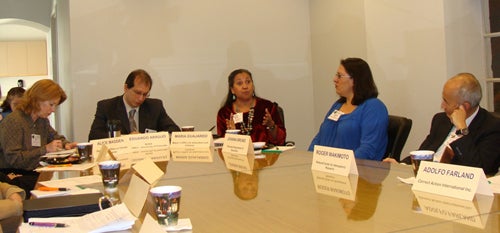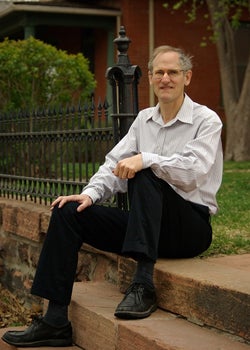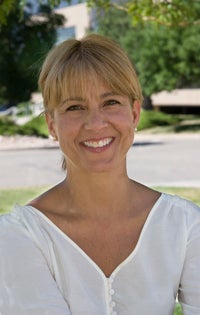Listening and learning
An eclectic group ponders how to boost Hispanic enrollment in weather and climate science
Jun 8, 2010 - by Staff
Jun 8, 2010 - by Staff
10 June 2010 • The mysteries of the atmosphere are compelling enough to bring many into the fold of atmospheric and related science. But if you’re a first-generation college student from an underrepresented group, other factors may steer you away, according to UCAR’s Raj Pandya.
“If you’re a bright young Latina and you have a choice between medicine, law, or climate science, you might go for medicine or law because they provide a more obvious opportunity to benefit your community and a proven strategy for climbing the economic ladder,” he says.
This point was among many that emerged at a daylong “listening conference” held on 2 March by Metropolitan State College of Denver. Organized by UCAR’s Community Building Program, which Pandya directs, and Metro State, the meeting’s goal was to identify ways to increase Latino involvement in weather and climate science and green-economy careers. Partners included the University of Colorado Denver (UCD) School of Public Affairs and the Boulder-based Namasté Solar, one of the area’s leading alternative energy companies.
 At the table: the executive breakfast at the 2 March listening conference included (left to right) Alice Madden, from the Colorado Governor’s Office on Climate Change; Eduardo Araujo, NOAA/University of Colorado; Maria Guajardo, Denver Mayor’s Office for Education and Outreach; Joanna Bruno, Colorado Department of Education; and NCAR director Roger Wakimoto. (Photo courtesy Tony Tafoya, NOAA.)
At the table: the executive breakfast at the 2 March listening conference included (left to right) Alice Madden, from the Colorado Governor’s Office on Climate Change; Eduardo Araujo, NOAA/University of Colorado; Maria Guajardo, Denver Mayor’s Office for Education and Outreach; Joanna Bruno, Colorado Department of Education; and NCAR director Roger Wakimoto. (Photo courtesy Tony Tafoya, NOAA.)
Along with university and laboratory scientists, the meeting involved experts in education and others familiar with the structure and culture of the local Hispanic community, including a feature known as the “Colorado paradox.” Mirroring a national trend, Latinos are the fastest-growing ethnic group in Colorado, comprising 7% of the state’s population. The paradox lies in educational attainment. Although Colorado ranks among the top five states in the total number of degree holders per capita, white adults are more than three times as likely as others to hold a bachelor’s degree—the largest such disparity in the nation.
 Richard Wagner (Metropolitan State College of Denver). (Photo courtesy Metro State.)
Richard Wagner (Metropolitan State College of Denver). (Photo courtesy Metro State.)
Richard Wagner, who heads the meteorology department at Metro State, has seen the paradox first hand. “Although enrollment at Metro State is about 15% Hispanic, the percentage lags in our department and in some other STEM departments [science, technology, engineering, and mathematics],” he says. Serving as a UCAR academic affiliate representative, Wagner got to know Quinton Williams (Jackson State University), a strong advocate of increasing diversity in atmospheric sciences.
“Quinton’s ideas about focusing on minority-serving institutions around the country got me thinking that Metro State could play an important role as one of relatively few public urban UCAR schools,” says Wagner. In addition, Metro State has embarked on becoming one of the nation’s Hispanic Serving Institutions, of which more than 200 are now registered with the Hispanic Association of Colleges and Universities. Wagner notes that Metro State was recently highlighted by Excelencia in Education as an exemplar Emerging HSI, an institution that does not yet meet the enrollment threshold of 25 percent but has the potential to achieve HSI status in the next few years.Those factors, plus Metro State’s close proximity to UCAR, made the college a natural partner for the listening conference, which Wagner and Pandya co-organized.
Making science family friendly
In a series of working groups, the meeting’s 100 participants tackled a variety of potential barriers and opportunities centered on Latino involvement in STEM education and came up with several immediate recommendations. One of the biggest overarching messages was “the earlier, the better.” If K–12 students can be exposed to science in a coordinated, sustained manner, experts believe it’s more likely they and their parents will see a degree in weather and climate science, or a green-energy job, as a viable option.
“Many of these leaders indicated that the path should start in middle school,” says Marina LaGrave, a Latina member of UCAR’s Education and Outreach Program, who co-chaired the conference planning committee with Wagner. Parents must be reached early as well, she says, because the close-knit structure of Latino family life means that parents are heavily involved in their kids’ educational choices. According to the Council on Contemporary Families, Latino parents are more likely than whites to believe that it is important for their children to attend college.
 NCAR's Marina LaGrave.
NCAR's Marina LaGrave.
One challenge is to help channel that parental interest toward science. This includes inviting parents to settings where their children may someday work, such as NCAR's Mesa Laboratory, which hosts some 80,000 visitors each year. “The traffic we get is mostly from students and teachers, not from the parents,” says LaGrave. “We are missing an important opportunity to engage the whole family.” At the suggestion of NCAR’s Vidal Salazar, LaGrave and colleagues invited 100 members of Latino families in the Denver region to the NCAR and UCAR 50th anniversary open house in June, with transportation provided and volunteer translators on hand. “This is a unique opportunity to strengthen their comfort with our institution and the science we offer,” says LaGrave.
Another of the meeting’s conclusions was that research laboratories, including NCAR and NOAA, need to make a serious commitment to engaging Latino students beyond occasional outreach to classrooms. High school is a critical time for solidifying interest in science, says LaGrave: “This was a theme heard over and over during the day.”
In August, NCAR will host eight high school students, four of them from underrepresented groups in the Denver area, for a month-long internship program. Participants will learn about career options and experience a taste of research, including analysis and presentation. The effort will build on the lessons of the UCAR-based SOARS program (Significant Opportunities in Atmospheric Research and Science), which has helped dozens of students from underrepresented groups make the leap from undergraduate to graduate school and on to doctorates.
Wagner was happy to see that a variety of opportunities and potential projects emerged from the listening conference. He’s become convinced of the value of promoting STEM literacy in general, rather than focusing too much on a single discipline. “One of the great outcomes of the conference for me was a broadened definition of ‘weather and climate professionals,’ ” he says. “I’m increasingly thinking about how to tie sustainability and climate change adaptation into our meteorology curriculum and my courses.” Wagner also plans to develop more ties with the community through service learning projects connecting nonprofit science education organizations and college student clubs, and he’s forging new collaborations with peers at UCD and Community College of Denver, both of which share a campus with Metro State.
For Stephanie Rivale, the meeting pulled together several strands of her professional life: “It felt like a coming home.” One of the first SOARS protégés in the late 1990s, Rivale completed her master’s degree in chemical engineering at the University of Colorado at Boulder (CU). She then worked as an engineering consultant and an adjunct faculty member at Metro State. Ultimately, she found the quest to improve engineering education a stronger draw than working as an engineer herself. Rivale is now completing her doctoral thesis in STEM education at the University of Texas in Austin while serving as director of K–12 engineering education for CU’s BOLD Center (Broadening Opportunity through Leadership and Diversity).
Rivale’s doctoral work examines how engineering experts solve closed-end textbook problems versus the kind of open-ended problems more commonly found in the workplace. The study builds on her research group’s earlier work involving students solving these problems. “What we’ve been learning is that if you motivate students with the more interesting problems, they learn better, their knowledge is more integrated, and they’re able to transfer it to other kinds of problems better.” The results have solidified Rivale’s commitment to providing students opportunities for hands-on engineering and science experiences, where—as she did herself in SOARS—they can connect their textbook knowledge to actual research.
Making academic science more interesting and relevant to students in general should also help bolster interest among Latinos, says Rivale, as long as institutions can reach out to them. “If you send the same messages we’ve been sending about what engineering and science are, you’re going to get the same people. It’s a system that keeps perpetuating itself. The people who aren’t interested or don’t feel comfortable don’t stick around.”